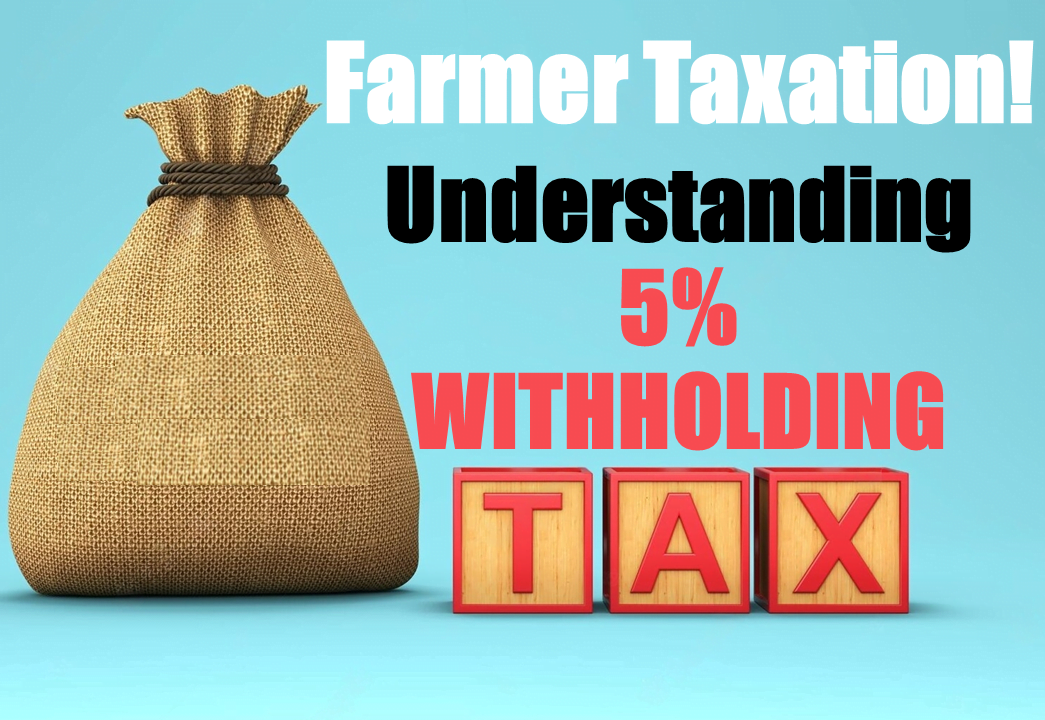Understanding Kenya’s 5% Withholding Tax on Agricultural Produce

Kenya is taking significant strides towards restructuring its agricultural taxation system. The Kenyan government’s recent proposal to introduce a 5% withholding tax on agricultural products delivered to cooperatives or other organized groups has sent ripples through the country’s farming community.
In his statement, the Cabinet Secretary, National Treasury & Economic Planning, Prof. Njuguna Ndung’u, disclosed that in FY 2022/23, Kenya’s tax gap was estimated at 11.5% of GDP, indicating the need for the government to take measures to increase the tax-to-GDP ratio and ensure effective provision of services to the public.
Revenue collection from the agricultural sector has long been a challenge for many African governments. Historically, a substantial portion of agricultural income has escaped formal taxation due to the fragmented nature of the industry. The Kenyan government’s move to impose a 5% withholding tax seeks to remedy this issue by ensuring that revenue from agricultural produce is captured more efficiently. It is worth noting that this tax is designed to target agricultural producers delivering their goods to cooperatives or organized groups rather than individual small-scale farmers.
How Withholding Tax Works
Tax withholding is a way for the government to maintain its pay-as-you-earn income tax system. This means taxing individuals at the source of income rather than trying to collect income tax after wages are earned.
In the case of the proposed taxation system by the Kenyan government, this will mean that whenever a farmer delivers produce to the cooperative or farmer society and gets paid, the entity withholds five percent of the amount due to them as income tax. This is then paid by the cooperative or society (withholder) to the Kenya Revenue Authority (KRA). The amount withheld should be remitted online by the withholder to KRA on or before the 20th of the following month.
Upon successful remittance of the withheld amount to KRA, the system generates and sends copies of the Withholding Certificate to the registered email addresses of both the cooperative or society (withholder) and the farmer (withholdee).
The amount deducted appears on the farmer’s payslip or statement, and the total amount deducted annually can be found on the P9 Form, which is a standard tax deduction card or form issued by the employers (in this case, the cooperative society) to the farmers with total emoluments. The cooperative or farmer society will then send the P9 Form to their members each year so they can file their annual income tax returns. The farmer will then be required to download the IT1 return form from the KRA online system and declare income earned as well as the tax withheld.
Although this proposal by the Kenyan government seems outrageous to many, it aligns with a global trend towards modernizing agricultural tax policies. In an era where governments are seeking innovative ways to boost revenue collection without overburdening the farming community, this approach warrants attention. This initiative by the government will be closely monitored by policymakers and experts, as it could serve as a case study for fine-tuning agricultural taxation systems in other regions.
While this may seem like a financial maneuver, it directly affects the lives of countless farmers and their families. The tax burden may result in disincentives for farmers to engage with cooperatives or organized farmer groups. However, if done correctly and with the right intentions, the system can have the transformative power of effective agricultural taxation. If appropriated well, the government can allocate resources more efficiently towards rural development, infrastructure, and agricultural extension services. This, in turn, empowers farmers with knowledge, resources, and market access, ultimately improving their livelihoods.
Only time will tell the effects this new tax system will have on the farming community in Kenya and on the country’s prominence as an agricultural hub in East Africa once it is implemented.
READ: Taxes on Alcohol and Sugar-Sweetened Products to Increase




2 comments
Jactone Orwa
January 27, 2024 at 11:21
I am an accountant by profession. Very informative indeed .Kindly alert of any farming related issues in kenya.
Eagmark
January 29, 2024 at 14:46
Hello Jactone,
Thank you for your kind words and for expressing your interest in staying updated on farming-related issues in Kenya. We’re thrilled to have readers like you who value the information we provide.
To ensure you receive timely updates on Kenyan agriculture, we invite you to join our dedicated WhatsApp group by clicking the link https://whatsapp.com/channel/0029Va8JkfHEAKWCXB13xE03 or subscribe to our newsletter if you prefer receiving updates via email. You’ll have direct access to informative content and the latest developments in the farming sector.
We appreciate your engagement and look forward to keeping you informed about the ever-evolving agriculture industry.
Best regards.
Eagmark Team